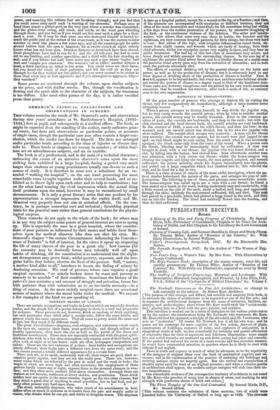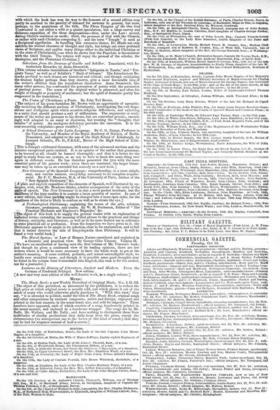PUBLICATIONS RECEIVE D.
BOORS.
A History of the Rise and Early Progress of Christianity. By Samuel. Hinds, D.D., Prebendary of Castleknock, Chaplain to his Grace the Arch- bishop of Dublin, and first Chaplain to his Excellency the Lord-Lieutenant of Ireland.
Pictures of Country Life, and Summer Rambles in Green and Shady Places. By Thomas Miller, .Author of "Beauties of the Country," &c. With thirty Illustrations, by Samuel Williams. Fisher's Drawing-room Scrap-book, 1847. By the Honourable Mrs. Norton.
The Juvenile Scrap-book, 1817. By the Author of "The Women of Eng- land."
New-Year's Day; a Winter's Tale. By Mrs. Gore. With Illustrations by George Crnikshank. The Boys Summer Book; descriptive of the season, scenery, rural life, and country amusements. By Thomas Miller, Author of 'Beauties of the Country," &c. With thirty-six Illustrations, engraved on wood by Henry Vizetelly. The Gallery of Scripture Engravings, Historical and Landscape. With Descriptions, Historical, Geographical, and Pictorial, by John Mao, D.D., F.S.A., Editor of the "Cyclopedia of Biblical Literature," &c. Volume L The Newleafe Discourses on the Fine Art Architecture: an attempt to talk rationally on the subject. By Robert Kerr, Architect. [The purpose of this strange and diffuse, but sensible and amusing little book, ie to advocate the claims of architecture to be regarded as one of the fine arts; and to separate the architectural designer from the mass of surveyors, builders en- gineers, and archmologists; above whom Mr. Kerr would exalt the "artist-archi- tect," placing him on a level with the poet, painter, and sculptor. This intention is worked out in a series of dialogues on the various points taken up by the author; the interlocutors being Mr. Newleafe, who represents Mr. Kerr, Aft. Ileavyithlieel his opponent, a disciple of the old school, and Dr. Verditurus who acts as moderator." Of course Mr. Newleafe has it all his own way; and he pours out his contempt for mere copyists of the five orders, drawers of plans, constructors of buildings, restorers of ruins, and explorers of antiquities, in a rhapsodical strain of talk, no less remarkable for verbosity and quaint affectation of originality than for force of argument end felicitous illustration: some smart hits and sound remarks are scattered up and down among bad jokes and conceits. If the author had enforced his views in a more concise and less eccentric manner, he would have commanded attention in quarters where he is likely to meet with ridicule if not neglect. There is truth and cogency in much of what he advances, as to the superiority of the designer of original ideas over the herd of mechanical copyists and re- storers; and in his condemnation of the practice of imitating old buildings reviving antique styles we heartily agree. But the revival and reproduction of obsolete styles exist for want of an original inventor; and when a creative genius in architecture shall appear, the modern-antique mongers will sink into their na- tive insignificance. One remarkable evidence of the retrospective tendency of architects is not note& by Mr. Kerr—the practice of using iron in shapes of stone, and masking its airy strength with ponderous shams of brick and stucco.] The Three Temples of the One God Contrasted. By Samuel Hinds, Da, &c. Second edition.
[This volume contains the substance of three sermons, two of which ware preached before the University of Oxford so long ago as 1829. The slowness
with which the book has won its way to the honours of a second edition may partly be ascribed to the paucity of demand for sermons in general, but more, perhaps, to the quaintness of the title. The Three Temples of the One God Contrasted is not either a wild or a quaint speculation, but a large survey and elaborate exposition of the three dispensations-first, under the Law; second, during Christ's residence on earth ; third, the presence of God with the Church, or rather with each Christian composing it: and the term " Temple " is used as a Scriptural appellation. In handling this extensive theme, Dr. Hinds not only exhibits his wonted closeness of thought and style, but brings out some profound views of Scripture and applies many things either to the individual Christian or to the state of Christianity,-as when he shows that the Popedom is inconsistent with the third Temple. The volume will repay the perusal of the scholar, the theologian, and the Protestant Christian.] Selections from the Dramas of Goethe and Schiller. Translated, with In- troductory Remarks, by Anna Swanwielt [This volume contains translations of Goethe's " Iphigenia in Tauris," and " Tor- quato Tease," as well as of Schiller's "Maid of Orleans." The Introductory Re- marks prefixed to each drama are historical and critical; and though estimating the dramas higher perhaps than they deserve, give a more favourable idea of the writer's abilities than the translations themselves. Anna Swanwick, like many other persons, has confounded the perception of poetry with the possession of poetical power. The sense of the original writer is preserved, and often his weight of thought or propriety of sentiment; but the spirit of dramatic poetry has evaporated in the translation.] Vie Union of Christians; a Poem. By John Tod Brown. [The subject of his furnishes Mr. Brown with an opportunity of sarcastic-
ally reviewing the di nt sections of Christianity, investigating the evil dispo-
sitions and irreligious spirit which occasion religious differences, and exhorting to a unity that should produce a sort of millennium. The arguments or senti- ments of the writer are germane to his theme, but are somewhat prosaic; exceed- ingly well adapted to an essay or discourse, but wanting the "thoughts that breathe" of poetry. An analogous deficiency pervades the execution. It is the ever-recurring complaint-prose versified.] A School Grammar of the Latin Language. By C. G. Zumpt, Professor in the University, and Member of the Royal Academy of Science, of Berlin. Translated, and adapted to the use of the High School of Edinburgh, by Leonard Schmitz, Pb. D., F.R.S.E., Rector of the High School of Edin- burgh.
[This is Zumpt's celebrated Grammar, with some of the advanced sections and the minuter exceptional parts omitted. It is an opinion of the author that grammar, to be learned at all, should be learned thoroughly; and that it is better for the pupil to study from one system, so as not to have to learn the same thing over again in different words. He has therefore presented the tyro with the more essential parts of his greater work: when these are mastered, the larger Gram- mar may be taken up as an extended but scarcely as a new book.]
New Grammar of the Spanish Language: comprehending, in a most siniple,
• easy, and concise manner, everything necessary to its complete acquire- ment. By F. C. Meadows, M.A. of the University of Paris, Author of the "New Spanish Dictionary," &c. [A plain and explicit exposition of the elements of Spanish, well illustrated by ex- amples, with, what Mr. Meadows thinks, a better arrangement of the order of the p i
arts of speech. The New Grammar s in size a mere pocket brochure, but the runglness of the type enables it to contain a large quantity of matter. In case of a new edition, this close packing might be changed into a more open order, for the smallness of the letter is likely to confuse as well as 'to strain the eye.] A Technological Dictionary: explaining the terms of the arts, sciences, literature, professions, and trades. By W. IL Buchanan, Editor of "The Practical Mechanic and Engineer's Magazine," &c. object of this book is to supply the general ;ceder with an explanation of tinical terms; extending the meaning of that phrase to the practices and things of history, antiquity, and literature, as well as to its more limited use in reference to sonic practical art or profession. From the inspection we have given to it, the Dictionary appears to be ample in its selection, clear in its explanation, and so full that it rather deserves the title of Encyclopedia than Dictionary. It will be found a very useful book.] The Moral System; or Law of Human Nature considered and explained in a theoretic and practical view. By George Giles Vincent Volume IL [We have no recollection of having seen the first volume of Mr. Vincent's book; and though he gives a condensed view of its leading opinions, there are few writers where it would be more necessary to have the whole work to get at the author's meaning. A more crabbed, pedantic, and indeed unintelligible style, we hardly ever stumbled upon; and though it is possible some good thoughts may be found in his volume were it translated into English, this task is for the author, not fern journalist.] Lectures on the History of Literature, Ancient and Modern. From the German of Frederick Schlegel. New edition.
[A new and very neat edition of this well-known work, xi a single volume.] Mom.
The Musk Book; a new Weekly Periodical of Original Music. Nos. L II. III. [The object of this periodical, as announced by the publishers, is to reduce the high price at which original music is usually sold, and which places it out of the reach of many who would otherwise gladly purchase it. "With this view," they say, 6 it is intended to publish, under the title of The Music Book, original songs and other compositions -by eminent composers, native and foreign, engraved and printed in the best manner, in the usual music size, and sold for sixpence." Three numbers have appeared, each h of which consists of a song, handsomely printed in the usual manner, and enclosed in a handsome wrapper. The songs are by Mr. Balfe, Mr. Wallace, and Mr. Tally; and have nothing to distinguish them from multitudes of similar productions that daily issue from the press, except the circumstance (no unimportant one to the lovers of this kind of music) that they carfbe had for sixpence instead of half-a-crown.]



























 Previous page
Previous page